Patriarch Kirill takes part in opening of 2nd Summit of World Religious Leaders in Baku

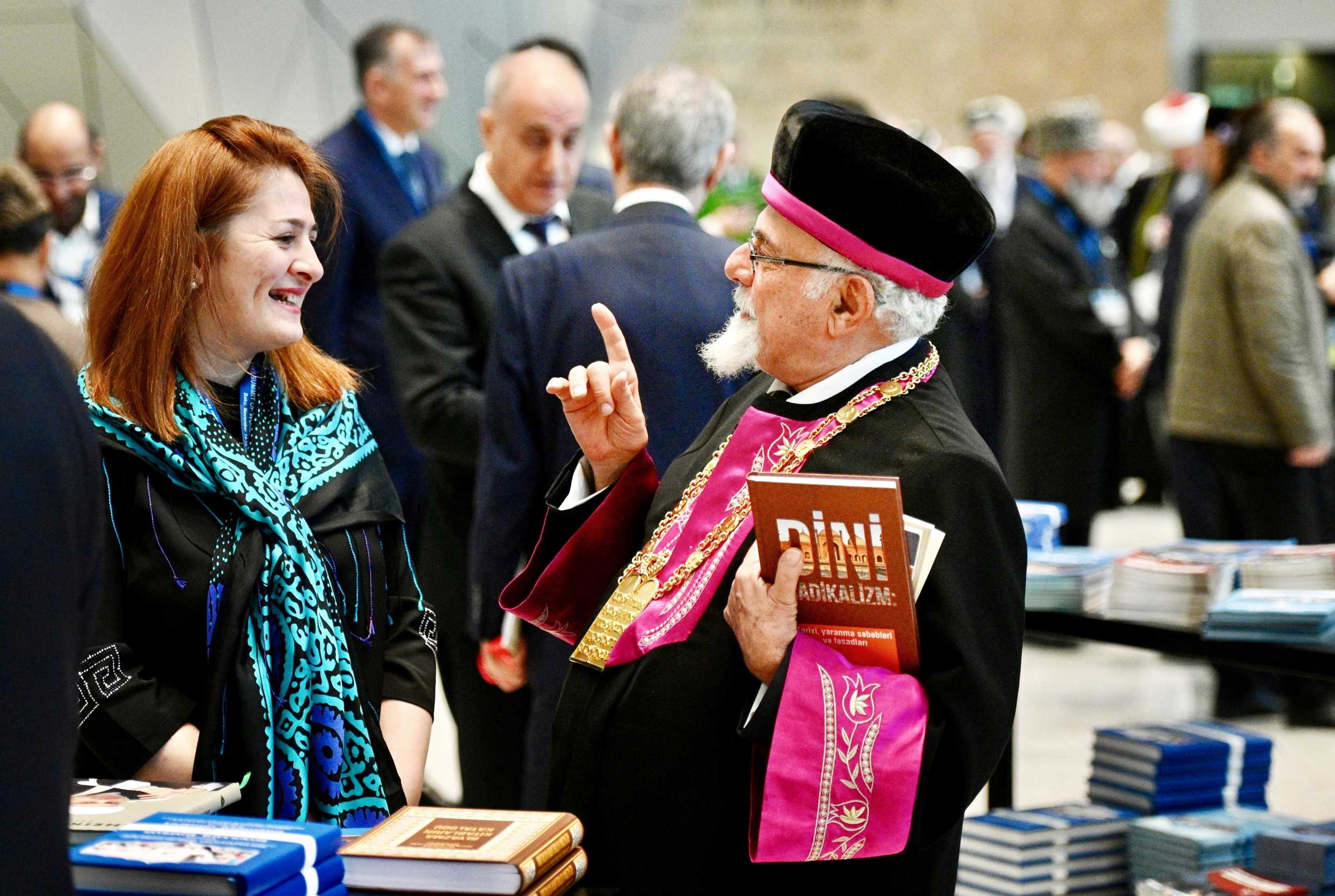
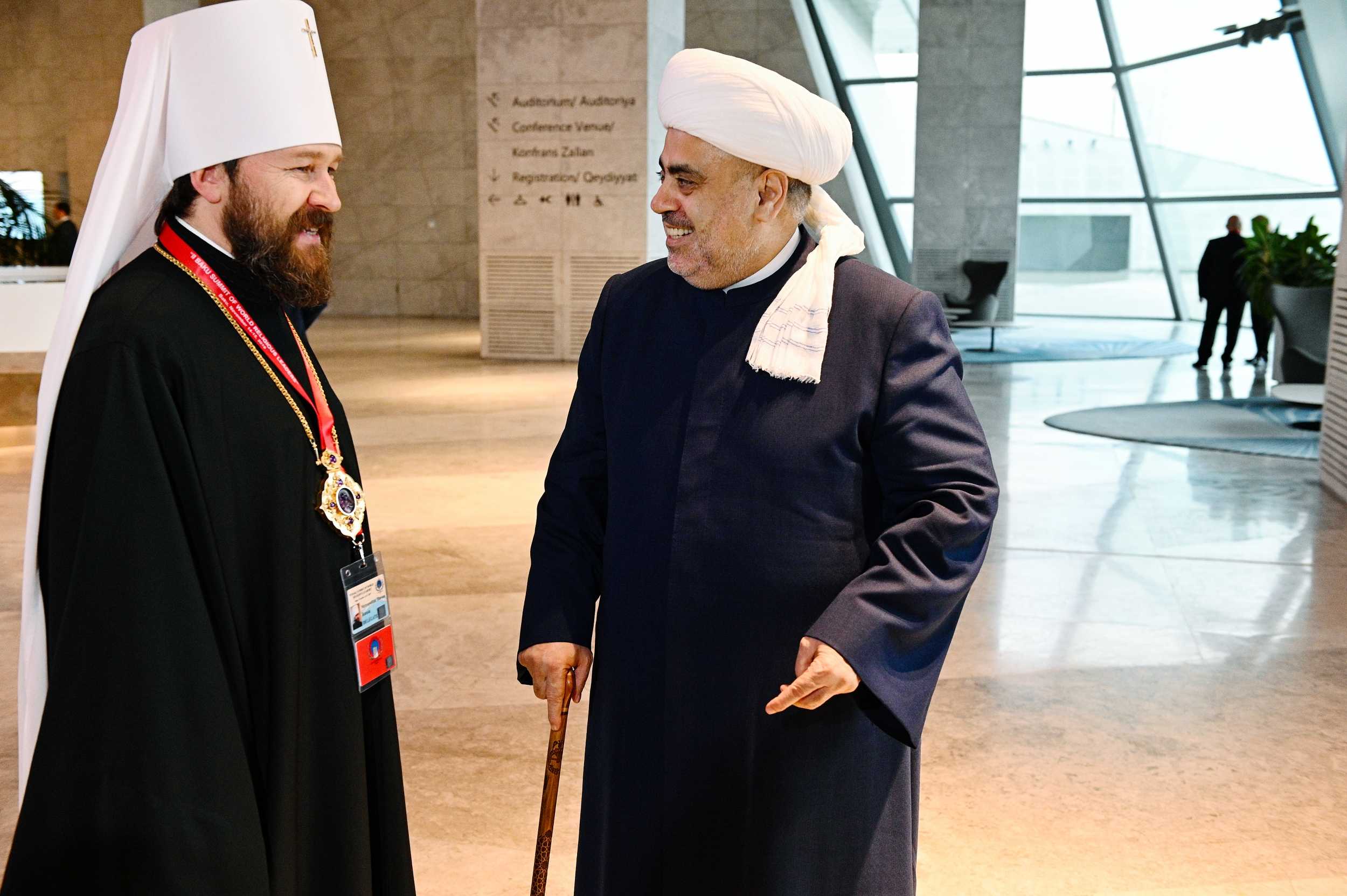





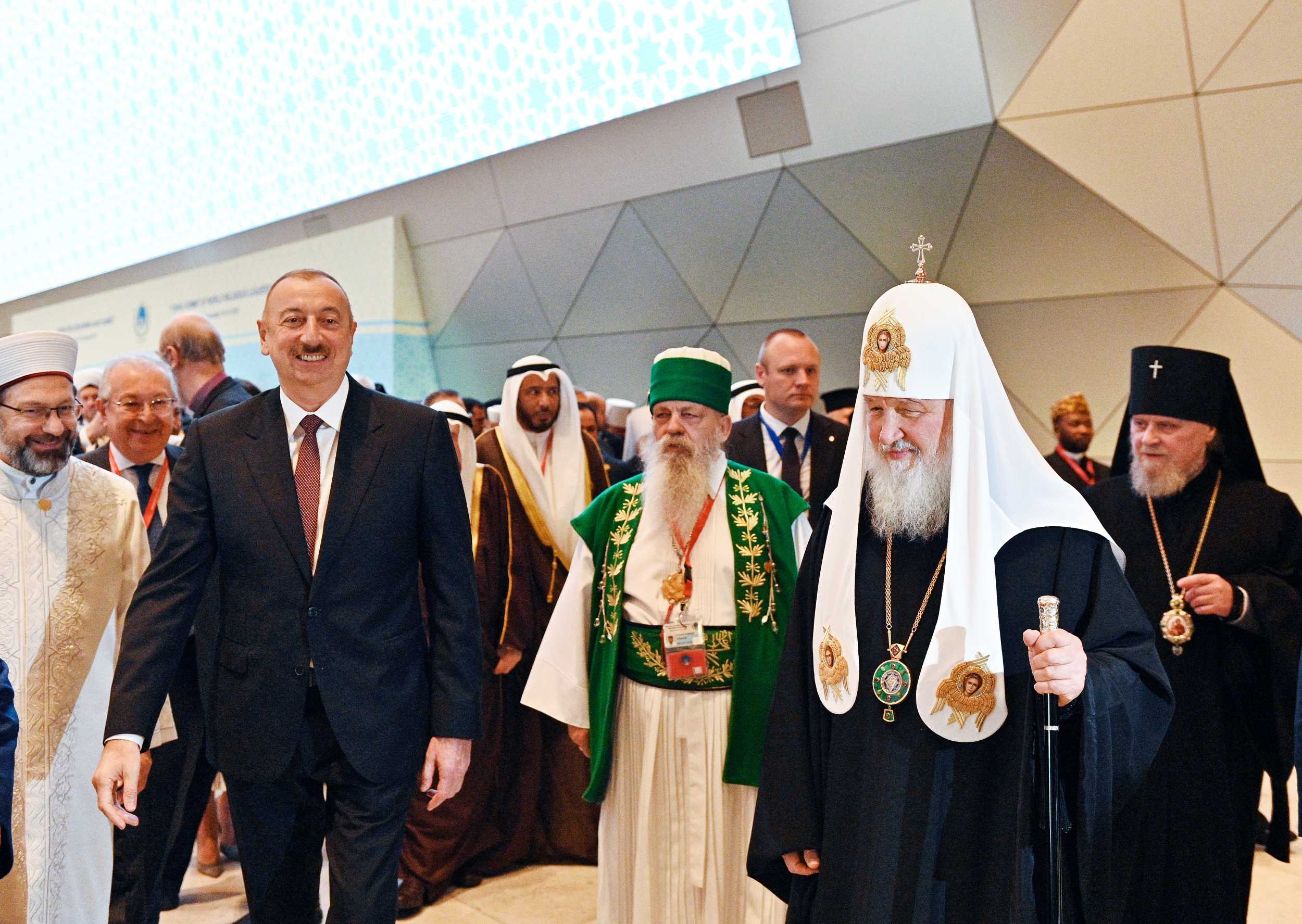
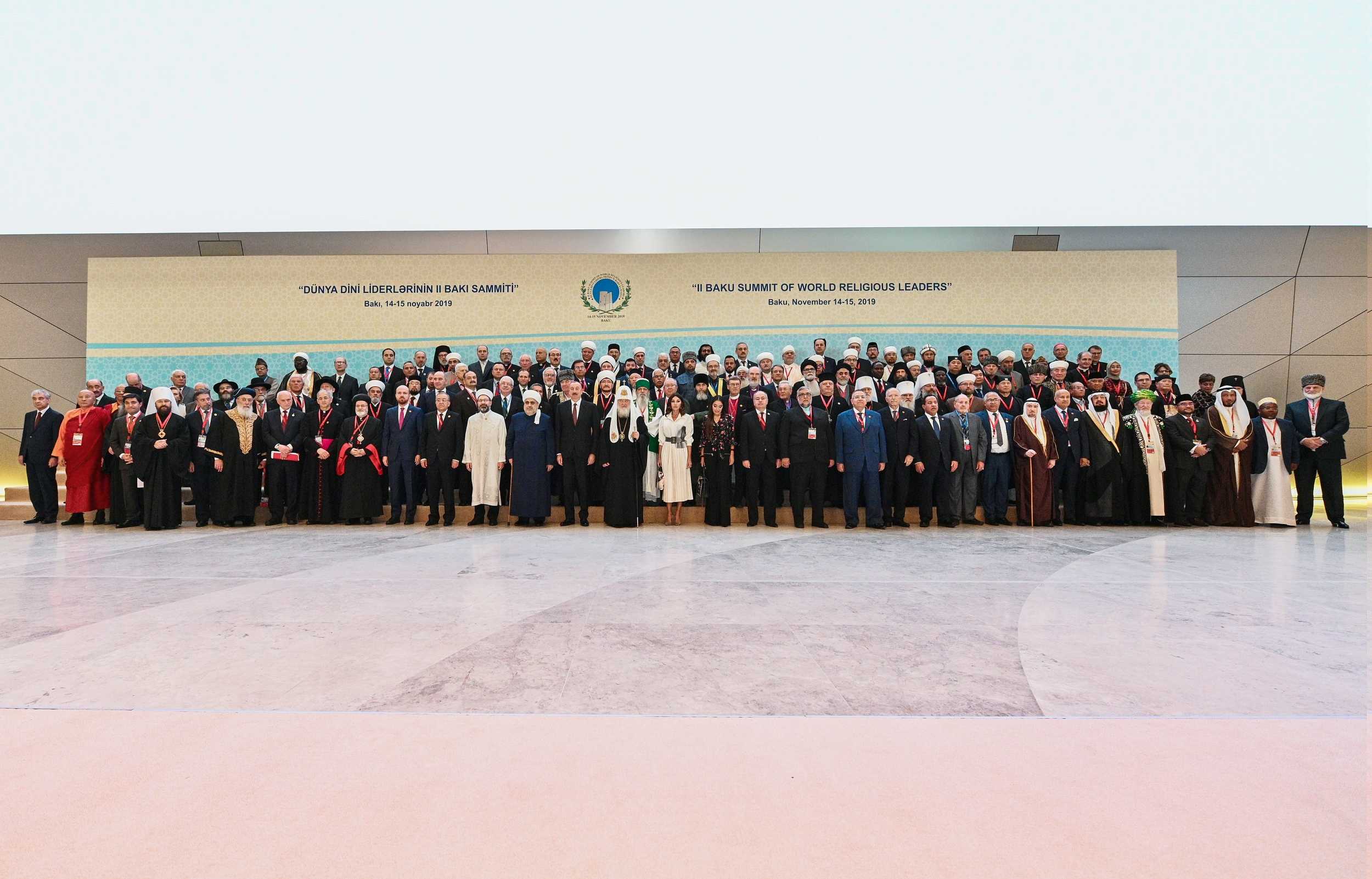


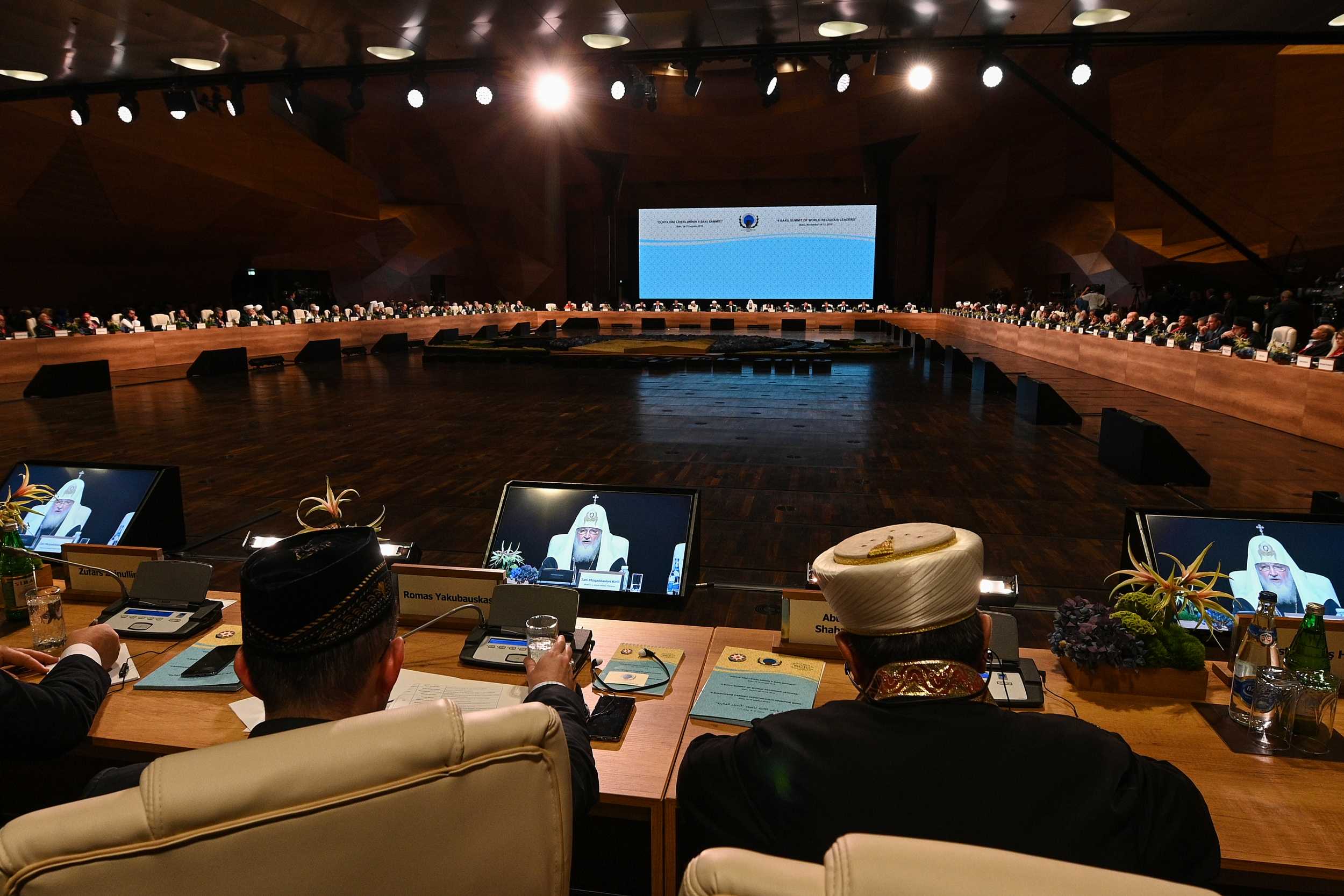
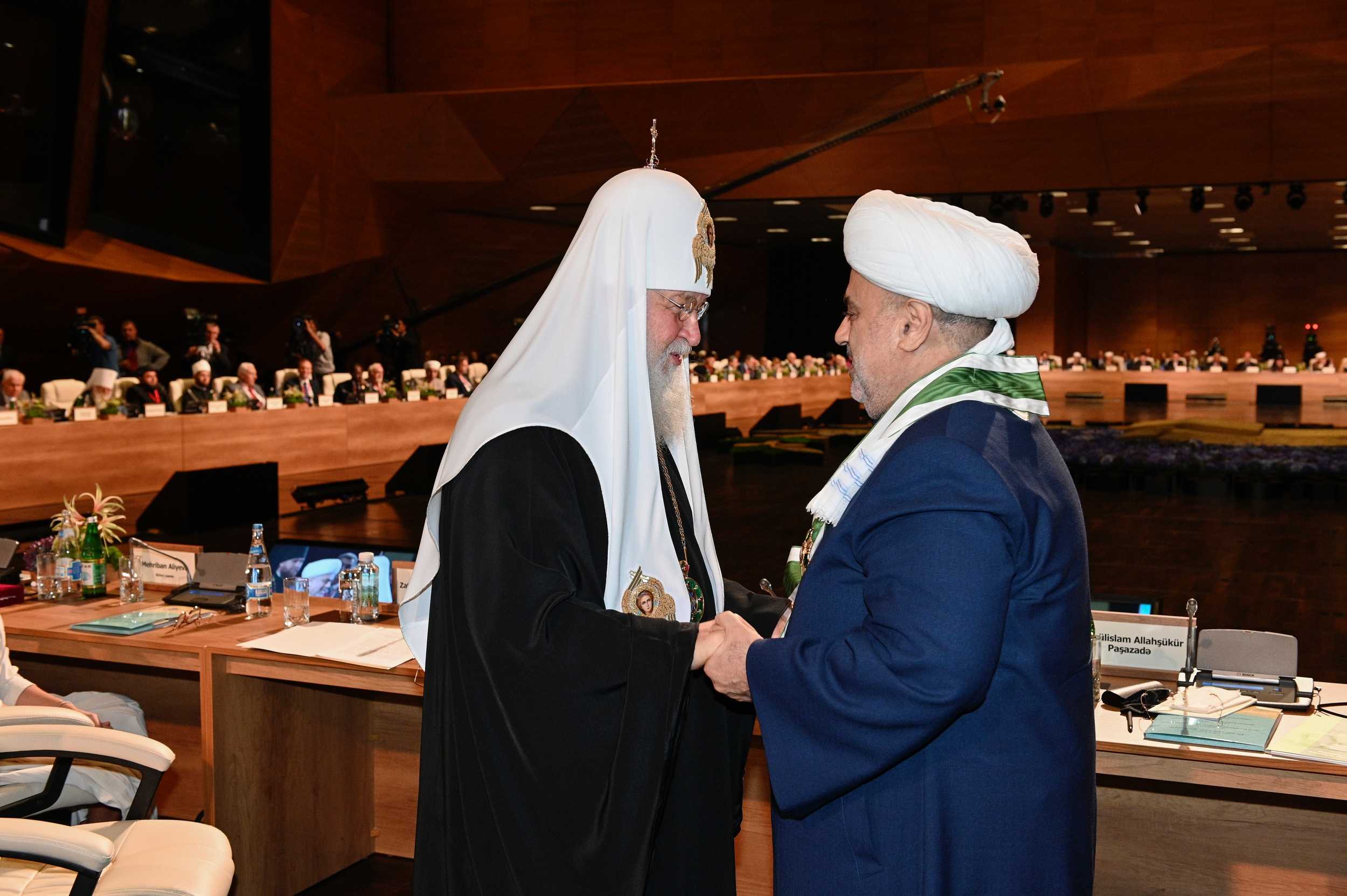
November 14, 2019 – the Second Summit of World Religious Leaders has opened in the Congress Center in Baku. Timed for the 70th birthday of the chairman of the Caucasus Muslim Board (CMB), Sheikh-ul-Islam Allahshuqur Pasha-zade, and the 40th anniversary of his service as the CMB chairman, it has been organized by the CMB and the Azerbaijani authorities.
The summit was welcomed by Azerbaijan’s President Ilham Aliyev. ‘This international meeting is very important and we a proud that Azerbaijan hosts this grandiose event for the second time’, the head of state underscored. He noted that Azerbaijan at all times supported the tradition of constructive interreligious contacts and dialogue, ‘For centuries our country has been the home of people of various ethnic groups and various religions, living as one family, in friendship and mutual understanding. Religious and ethnic diversity is our great treasure. It promotes successful development and stability’.
President Aliyev gave a great value to the work of Sheikh-ul-Islam Allahshuqur Pasha-zade, stressing that he gained a great authority both inside and outside the country. He presented the head of the Caucasus Moslems with the country’s highest award – the Order of Heydar Aliyev.
This was followed by a speech of Sheikh-ul-Islam Allahshuqur Pasha-zade.
Delivering his remarks, Patriarch Kirill focused on new challenges facing traditional religions. ‘The last decades have been darkened by numerous conflicts in various parts of the globe and unprecedented rampage of terrorism. Terrorists spill the blood of innocent peaceful people. Sri Lanka, New Zealand, Syria, Iraq, Afghanistan, Germany, France – this is by far not the full list of countries in which terror actions have been committed to shock the world.
‘It should be admitted that there is a war waged against traditional religions. It is waged in cities and villages, in the information space and, most importantly, in the hearts and minds of people. What is most dangerous is that those who fight on front lines are young people. The ideologues of extremist movements use the youth’s lack of experience, their readiness to resort to all means to defend their views. The situation is aggravated by the very low level of their awareness, lack of basic knowledge of not only about other religions but also of their own religious tradition’.
His Holiness pointed out that a certain success of the extremist propaganda can be accounted for by, in the first place, extremists exploiting religious people’s rejection of the modern secular paradigm, He said, ‘When it is impressed on them from all sides that the most important thing in life is success, wealth and pleasure, a believer cannot but oppose such an aggressive imposition of false values. The crisis of the traditional system of values offers a broad field for the work of extremist recruiters. They find it easy to substitute the secular ideology by their own one; their seeds fall on a prepared soil. It is for this reason that religious leaders should not only reject and condemn extremism but also educate society for the unshakable values based on Holy Scriptures, support for suffering and underprivileged people, and we should actively transmit these ideas supported by convincing examples to the information space’.
In his remarks, His Holiness dwelt on the situation in the Middle East, whose population have been badly affected by the destructive bloody conflicts of the last years becoming a reason for mass migration in the regions, as well as in several countries in Africa. He called to give attention to the persecution of Christians in these regions: ‘An irreparable damage has been inflicted on the Christian presence in the Middle East, the holy land for all Abrahamic religions. History has shown that Christians, Muslims and Jews have lived together for centuries in that land. And today they are equally responsible for preserving peace, His Holiness stressed. Speaking about the persecution of Christians, he said that the problem of Africa could not be ignored. ‘Many states south of the Sahara Desert are suffering from the uncontrolled activity of extremist groupings. In Nigeria, in particular, a real genocide is carried out against Christians. ‘I call all people of good will’, he said, ‘not to ignore the problems of Christians in African countries’.
Noting that the forum has gathered numerous representatives of various religious traditions, Patriarch Kirill emphasized, ‘In spite of objectives difference in doctrines, we have identical views on moral guidelines of human life’. In his opinion, religious leaders can and must appeal in one voice to political leaders: ‘It is time to unequivocally state that it is necessary to stop solving geopolitical problems at the expense of the weak, including weaker states. It is time to stop the irresponsible partition of power resources. It is time to stop dividing countries of the world into first, second and third ones. It is desirable that more developed and rich countries should become aware of their responsibility for the fate of humanity. They should be guarantors of security and stability, not dictators of a global order. As practice has shown, the imposition of their own rules, traditions and culture by certain states does not lead to anything good. The distinctive character and freedom of peoples is a guarantee of their safe and peaceful co-existence. It is very important that the depredation of natural resources in not rich countries and pollution of the environment should be stopped. We are responsible for God’s creation made for the benefit of humans. Our message is addressed to each one, and we sincerely believe that it will be heard’.
Patriarch Kirill expressed the confidence that religious leaders through dialogue could make a serious impact on problems facing humanity today. ‘Our voice will be convincing if it is a common and solidary one. I am confident that together we can bear witness to the peace-making calling for which we are responsible before the Almighty. I sincerely wish that today’s forum may become a confirmation of this’ he said.
His Holiness also extended congratulations to Sheikh-ul-Islam Allahshuqur Pasha-zade on the significant dates he celebrated. ‘The fact that hundreds of religious leaders have come to Baku today from all over the world speaks a lot, and in the first place about the highest authority enjoyed by venerable Sheikh-ul-Islam. We have known him for many decades as a consistent proponent of friendship and dialogue among religions and peoples’, he stressed.
In recognition of his support for the Russian Orthodox Church in its peace-making service and on the occasion of his 70th birthday, Patriarch Kirill presented Sheikh-ul-Islam Allahshuqur Pasha-zade with the Order of St. Seraphim of Sarov (First Degree).
Mr. I. Ukhmanov, deputy chairman of the Russian Council of the Federation, read out a message of greetings from Russia’s President Vladimir Putin, who noted in it in particular that by his longstanding selfless service for peace and social accord in the Caucasus, Sheikh-ul-Islam Allahshuqur Pasha-zade gained ‘a high and indisputable authority both inside and outside Azerbaijan… With profound satisfaction I point out your significant contribution to the consolidation of fruitful co-work with central Muslim organizations in Russia and with the Russian Orthodox Church, to the development of Russia-Azerbaijan relations based on the longstanding traditions of friendship, good-neighbourliness and mutual confidence’, Vladimir Putin’s message reads.
Attending the 2nd Baku Summit are about 200 religious leaders from various traditional religions, as well as experts, diplomats, state official and public figures from many countries. Messages of greetings were received from leaders of religious communities and heads of international organizations.
On November 14 and 15, panel discussions will be held on interreligious solidarity, multiculturalism and religious tolerance. In the sections, participants will consider the struggle of religious leaders against terrorism, hatred, xenophobia, Islamo- and Christiano-phobias and antisemitism, importance of cooperation between traditional religions, state, academic community and the public in protecting the rights of women and children, in education and formation of the youth. The participants will also share their thoughts about the importance of the work carried out by Sheikh-ul-Islam Allahshuqur Pasha-zade for the development of intercultural and interreligious dialogue.
***
The first Baku Summit took place on April 27-29. 2010, under the theme ‘Globalization, Religion, Traditional Values’, which was a continuation of the tradition of such forums since the 2006 Summit in Moscow. It was organized by the Azerbaijani authorities, the Caucasus Muslim Board, UNESCO and the CIS Interreligious Council. Its final document stressed the importance of interreligious cooperation and called to the establishment of interreligious councils. It also dealt with such problems of extremism, terrorism, secularization and globalization.
On the sidelines of the forum, Patriarch Kirill had a tripartite meeting with Allahshuqur Pasha-zade and the Catholicos of All Armenians Karekin II to consider the settlement of the situation in Karabakh. In addition, a meeting of the CIS Interreligious Council took place in the Caucasus Muslim Board and on the following day, a meeting of the Group of High-Ranking Religious Leaders in Partnership with UNESCO.
DECR Communication Service
